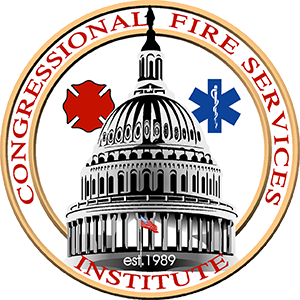Congressional Fire Services Caucus Conducts 5th Annual Flag Presentation with National Fallen Firefighters Foundation
(October 5, 2018) – On Thursday, October 4th, the leadership of the Congressional Fire Services Caucus presented 103 American flags to the National Fallen Firefighters Foundation. The flags, which had been flown over the United States Capitol Building at the request of the Fire Caucus, will be presented to the survivors of the firefighters being honored at the 37th Annual National Fallen Firefighters Memorial Service on Sunday, October 7th in Emmitsburg, Maryland.
Senator Jon Tester (MT), a co-chair of the Fire Caucus, presided over the official transfer of the flags to Chief Dennis Compton, the chair of National Fallen Firefighters Foundation (NFFF) Board of Directors. Senator Tester was joined by the Senate Chaplain, Admiral Barry Black, as well as senior staff from the office of Senator Susan Collins (ME), the current chair of the Fire Caucus. Bill Webb, Executive Director of the Congressional Fire Services Institute and Vice-Chair of the NFFF Board, served as the Master of Ceremonies.
103 firefighters will be honored at the Memorial Service, 80 who died in the line-of-duty in 2017, and 23 from previous years. 17 of the firefighters being honored died as a result of 9/11-related illness.
Details about the 37th Annual National Fallen Firefighters Memorial Service, including how to view, can be found on the NFFF website.
